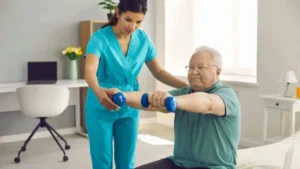Many people turn to skilled nursing facilities and rehab centers for ongoing support. Still, they often don’t realize that in-home care can be a better alternative in terms of care quality, affordability, and peace of mind. In this article, we’ll explore how you can support your loved one’s recovery with the help of care provided right at home.
Post-Hospital Care for the Elderly in Hamilton:
If you are in Hamilton or have elderly parents or grandparents who require ongoing help with daily activities and medical care, home care can be a practical and supportive option.
You can hire a Registered Nurse (RN) if your loved one has medical needs that require professional attention. For example, if they need wound care, injections, monitoring of vital signs, managing complex medications, or have conditions like diabetes, a nurse is the right choice. On the other hand, if your loved one doesn’t have critical medical needs but still needs help with everyday tasks and comfort, a Personal Support Worker (PSW) is a more suitable and affordable option.
1. Activities of Daily Living:
Things like getting out of bed, taking a bath, putting on clothes, or even eating can feel tough. A caregiver can help with all activities of daily living step by step. They’ll make sure they’re clean, comfortable, and not struggling with tasks that might feel overwhelming to your loved one. Just getting help for activities and daily living can improve the quality of life for seniors recovering at home.
2. Wound Care:
If your loved one has stitches, surgical wounds, or pressure sores, proper wound care becomes crucial. Home care nurses are trained to clean and dress wounds carefully. They also watch for signs and risks of infections, and make sure everything is healing properly.

3. Medication Management:
It’s common for seniors to leave the hospital with several prescriptions. That can get confusing, especially if doses or timings change. Home caregivers can help keep track of medications, give gentle reminders, and make sure your loved one is taking the prescribed medication on time. Nurses can also spot side effects or issues early and update the doctor or family members if needed.
Read More: Medication Management for Seniors
4. Pain Management:
Pain is a normal part of recovery, but it still requires attention and techniques to bring comfort and ease to the patient. Home care nurses know how to monitor pain levels and give pain medications if needed. They also use other simple ways to manage pain and symptoms, like ice packs, warm compresses, relaxation techniques, or diversional therapies. Their goal is to keep your loved one as comfortable as possible.
5. Help with Mobility:
Your loved one is at a higher risk of facing limited mobility after a hospital stay. Home caregivers and nurses are trained to help seniors move safely and gently. They know how to support your loved one during transfers — from bed to a chair — and show them how to move in ways that reduce the risk of falling or getting hurt.
6. Physical Therapy:
If your loved one had surgery (like a knee or hip replacement), physical therapy is a significant part of the healing process. Many home care providers offer physical therapy services. A therapist guides your loved one through exercises that help in regaining mobility, strength, and balance. Caregivers can also help your loved one with exercises in between or after sessions.

Let ConsidraCare Take Care of Your Loved Ones:
If you’re looking for reliable care after a hospital stay, you’re in the right place. At ConsidraCare, we provide trusted in-home nursing services. Whether your loved one needs full-time support or just a few hours of help each day, our team of Registered Nurses and Personal Support Workers is here to assist.
We’ll work closely with your family to build a personalized care plan, and you’ll get real-time updates through our easy-to-use platform. We always keep you in the loop.
Schedule a free assessment today!
Final Thoughts:
Caring for a parent after they come home from the hospital can be a big responsibility, but home care can share some of it. With the right planning and support, you can help make their recovery smooth and comfortable.
FAQ’s
1. What should I prepare at home before my parent is discharged?
Make sure the home is safe and comfortable—remove tripping hazards, set up a resting area close to a bathroom, and stock up on any supplies or equipment they might need, like walkers, medications, or a hospital bed if recommended.
2. How do I manage my parents’ medications after discharge?
Keep a clear list of all medications, doses, and schedules. Use a pill organizer and set reminders if needed. Ask the doctor or pharmacist if you’re unsure about anything.
3. Can I get help caring for my parent at home?
Yes. Many families hire personal support workers or home care nurses to help with bathing, dressing, medication, wound care, and more. You can also check if your parent qualifies for government-funded services.
4. What signs should I watch for after hospital discharge?
Keep an eye on symptoms like pain, confusion, dizziness, fever, or any new or worsening issues. These could signal complications and should be reported to a doctor right away.
5. How can I support my parent emotionally during recovery?
Be patient and encouraging. Listen to their concerns, help them stay socially connected, and involve them in decisions about their care. Emotional support is just as important as physical help during recovery.
6. What is the after-surgery home care cost in Hamilton?
After-surgery home care in Hamilton typically costs:
-
Personal Support Workers (PSWs): $28–$35 per hour
-
Registered Practical Nurses (RPNs): $45–$60 per hour
-
Registered Nurses (RNs): $55–$80 per hour






